
Ethics & Bioethics
Scope & Guideline
Illuminating the intersection of ethics and medical practice.
Introduction
Aims and Scopes
- Interdisciplinary Ethical Analysis:
The journal emphasizes the need for interdisciplinary approaches to ethics, integrating perspectives from philosophy, law, medicine, and social sciences to address complex ethical issues. - Bioethics and Public Health:
A core area of focus is bioethics, particularly as it relates to public health, medical ethics, and the ethical implications of emerging technologies in healthcare. - Cultural and Social Ethics:
The journal explores ethical considerations within various cultural and social frameworks, analyzing how different societies approach moral dilemmas and ethical governance. - Historical and Philosophical Perspectives:
There is a consistent focus on historical philosophical theories and their relevance to modern ethical discussions, particularly in the context of Central European thought. - Ethics in Technology and AI:
The journal addresses the ethical implications of technological advancements, especially artificial intelligence and its integration into medical and business practices.
Trending and Emerging
- Ethics of Pandemics and Public Health:
There is a noticeable increase in publications addressing the ethical implications of pandemics, particularly related to healthcare access, vaccination, and public health strategies. - Artificial Intelligence and Healthcare:
The rise of artificial intelligence in medical contexts has prompted a surge in ethical inquiries regarding its implications for patient care, autonomy, and medical education. - Epigenetics and Ethical Implications:
Emerging discussions around epigenetics highlight the ethical considerations of genetic research and its societal impacts, indicative of a growing interest in the implications of biotechnological advancements. - Environmental Ethics and Philosophy:
Themes related to environmental ethics are gaining traction, reflecting a broader societal focus on sustainability, ecological responsibility, and the ethical dimensions of environmental challenges. - Patient Autonomy and Rights:
Recent publications emphasize the importance of patient autonomy in healthcare decisions, particularly in relation to emerging medical practices and technologies.
Declining or Waning
- Traditional Business Ethics:
Research on traditional business ethics, particularly in established sectors, has decreased as newer ethical challenges arise, such as those posed by technology and globalization. - National Identity and Ethnic Studies:
Themes surrounding national identity and ethnic studies are becoming less frequent, indicating a potential waning interest in these topics in favor of more global and universal ethical discussions. - Historical Ethical Theories:
While historical perspectives remain important, the specific focus on certain classical theories, such as utilitarianism and Kantian ethics, seems to have lessened in favor of contemporary ethical frameworks. - Local and Regional Ethical Issues:
There appears to be a declining emphasis on localized ethical issues specific to Central European contexts, as the journal increasingly engages with global ethical challenges.
Similar Journals

BIOETHICS
Bridging Philosophy and Practice in Contemporary Bioethical Issues.BIOETHICS is a leading academic journal published by Wiley, dedicated to exploring the multifaceted issues at the intersection of healthcare, philosophy, and policy. With an ISSN of 0269-9702 and an E-ISSN of 1467-8519, it has established itself as a critical platform for scholarly discourse since its inception in 1987. The journal holds impressive rankings, featuring in the Q1 category in both Health (social science) and Philosophy, alongside a Q2 rating in Health Policy for 2023. This positions BIOETHICS in the top echelons of its fields, ranking 35th out of 806 in Philosophy and garnering high percentiles across relevant disciplines. By fostering a deeper understanding of ethical implications in medical and social contexts, BIOETHICS serves as an essential resource for researchers, professionals, and students committed to addressing contemporary challenges in health and policy. The journal is accessible through institutional subscriptions and offers an engaging platform for the dissemination of significant research findings and theoretical advancements, paving the way for future exploration in bioethical inquiry.

Teoria-Rivista di Filosofia
Navigating the Depths of Philosophical ExplorationTeoria-Rivista di Filosofia is a distinguished academic journal published by EDIZIONI ETS, based in Pisa, Italy. With a focus on philosophical discourse, this journal is a valuable resource for researchers, professionals, and students in the field of philosophy. Having achieved a commendable Q3 ranking in the 2023 category quartiles, Teoria stands out in the competitive landscape of philosophy journals, with a Scopus rank of #612 out of 806, placing it in the 24th percentile. Although currently classified as a non-open access publication, it frequently addresses cutting-edge themes and challenges within philosophical research, promoting rigorous analysis and diverse perspectives. The journal spans various topics across multiple issues from its inception in 2011 to its ongoing publications scheduled through 2024, making it a relevant venue for contemporary philosophical inquiry. The journal aims to foster scholarly communication and stimulate critical debates, contributing significantly to the global philosophical landscape.
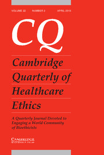
CAMBRIDGE QUARTERLY OF HEALTHCARE ETHICS
Illuminating Ethical Dilemmas in Health Systems.CAMBRIDGE QUARTERLY OF HEALTHCARE ETHICS is a premier journal published by Cambridge University Press, focusing on significant issues at the intersection of healthcare, ethics, and policy. With an ISSN of 0963-1801 and an E-ISSN of 1469-2147, this journal serves as a vital platform for discourse among researchers, practitioners, and scholars in the health social sciences. Emphasizing vital ethical considerations in healthcare practices and policies, it ranks in the Q3 tier for Health Policy and Q2 for both Health (Social Science) and Issues, Ethics, and Legal Aspects according to the 2023 journal category quartiles. The journal, spanning its tenure from 1992 to 2024, features rigorous peer-reviewed articles that contribute to the advancement of ethical standards in healthcare. By addressing contemporary ethical dilemmas and promoting scholarly dialogue, CAMBRIDGE QUARTERLY OF HEALTHCARE ETHICS remains an essential resource for those committed to understanding the complexities and ethical implications inherent in health systems today.
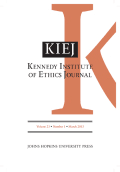
KENNEDY INSTITUTE OF ETHICS JOURNAL
Pioneering Insights at the Intersection of Ethics and Social ScienceThe KENNEDY INSTITUTE OF ETHICS JOURNAL, published by the prestigious Johns Hopkins University Press, stands as a leading periodical in the realm of ethics, particularly emphasizing the intersection of health policy, social sciences, history, and philosophy of science. With an ISSN of 1054-6863 and an E-ISSN of 1086-3249, this journal has been a cornerstone of ethical discourse since its inception in 1991. Renowned for its rigorous peer-review process, the journal boasts impressive rankings, including Q1 in History and Philosophy of Science and Q2 in Health (Social Science) for 2023. Researchers, professionals, and students alike will find this journal invaluable for navigating complex ethical issues, providing a platform for innovative research and discourse. Although currently not offering Open Access, its contributions to the fields of ethics and legal aspects of health are profound, making it an essential resource for those engaged in these critical discussions.
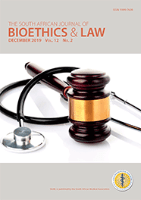
South African Journal of Bioethics and Law
Championing open access to critical bioethical and legal discourse.South African Journal of Bioethics and Law, published by HEALTH & MEDICAL PUBLISHING GROUP, stands as a vital academic platform for discussions at the intersection of bioethics and legal studies. With an ISSN of 1999-7639, this journal has embraced an Open Access model since 2008, ensuring global accessibility for researchers, practitioners, and students alike. Based in South Africa, the journal operates from PRIVATE BAG X1, PINELANDS, CAPE TOWN 7430, and features diverse articles that span a multitude of pertinent topics across health professions, law, and public health. It proudly holds a Q3 ranking in Health Professions and Law sectors, affirming its status within the scholarly community. Notably, for the year 2023, it has achieved impressive placements in Scopus ranks, reinforcing its commitment to disseminating high-quality research and fostering dialogues that influence policy and practice in these critical domains. Researchers exploring the intricate ethical and legal dimensions of healthcare will find this journal an indispensable resource.
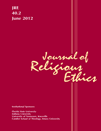
JOURNAL OF RELIGIOUS ETHICS
Exploring the Ethical Dimensions of FaithJOURNAL OF RELIGIOUS ETHICS is a premier academic journal dedicated to fostering scholarly discourse within the field of religious studies, specifically focusing on moral theory and its implications in various religious contexts. Published by Wiley, the journal showcases rigorous research and theoretical exploration related to ethical dimensions of religion, contributing significantly to the broader understanding of moral philosophy. With an impressive 2023 impact factor placing it in the Q1 category of religious studies and a commendable Scopus rank of 126 out of 644, it is positioned amongst the top-tier journals in its field, reflecting its influence and the high quality of its manuscripts. The journal welcomes diverse perspectives and interdisciplinary approaches, making it an essential resource for researchers, educators, and practitioners seeking to deepen their understanding of the ethical implications of various religious traditions. Serving a global audience from its UK base, the JOURNAL OF RELIGIOUS ETHICS continues to be an indispensable platform for innovative scholarship and dialogue.
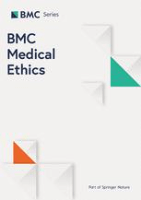
BMC Medical Ethics
Navigating the complexities of healthcare ethics.BMC Medical Ethics is a leading open-access journal dedicated to the critical exploration and dissemination of knowledge surrounding ethical issues in healthcare and medicine. Published by BMC, and headquartered in the United Kingdom, this journal has become a cornerstone in the field since its inception in 2000, with a remarkable focus on health policy, nursing ethics, and the complex legal aspects intertwining with healthcare practices. With an impressive Q1 ranking across multiple categories, including Health Policy and Health (Social Science), it ranks among the top journals globally—particularly notable with its Scopus rankings reflecting a strong 85th percentile in Nursing and an 81st percentile in Social Sciences. As an open-access publication, BMC Medical Ethics ensures that research findings are readily accessible, fostering a collaborative environment for researchers, practitioners, and students alike. The journal's commitment to ethical discourse not only advances academic inquiry but also shapes the practices and policies that govern healthcare delivery; thus, making it an invaluable resource for those engaged in the advancement of medical ethics.

Journal of Moral Philosophy
Pioneering Research in Moral PhilosophyThe Journal of Moral Philosophy is a prestigious scholarly publication dedicated to the exploration and analysis of ethical theories and moral frameworks. Published by BRILL in the Netherlands, this journal has established itself as a leading voice in the field, currently holding an impressive Q1 ranking in Philosophy for 2023 and positioned in the 75th percentile among similar publications in the Scopus Arts and Humanities category. Since its inception in 2004 and continuing through 2024, the journal seeks to provide a platform for rigorous philosophical inquiry, featuring original research articles, comprehensive reviews, and critical discussions that foster dialogue among scholars. Despite it not being open access, the journal maintains a strong commitment to advancing philosophical thought and engaging the academic community, making it an essential resource for researchers, professionals, and students aspiring to deepen their understanding of moral philosophy.
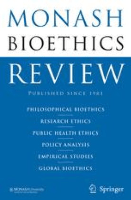
Monash Bioethics Review
Exploring Ethical Frontiers in Health and SocietyMonash Bioethics Review, published by SPRINGER HEIDELBERG, is a leading journal in the interdisciplinary realm of bioethics, dedicated to exploring critical issues at the intersection of health policy, philosophy, and the social sciences. With an impressive impact factor placing it in Q1 in Philosophy and notable rankings across disciplines, including Q3 in Health Policy and Medicine, it serves as an essential platform for researchers, professionals, and students alike. This journal not only aims to foster robust discourse on ethical dilemmas but also seeks to contribute to policymaking through rigorous analysis and research. Covering articles from its inception in 1994 to the present, Monash Bioethics Review remains committed to addressing contemporary ethical challenges in medicine and society, making it a vital resource for those keen on navigating the complexities of bioethical thought.

HEC Forum
Fostering Dialogue on Health Policy ChallengesHEC Forum, an esteemed journal published by Springer, is dedicated to advancing the field of health policy and ethics, bridging critical gaps between healthcare practices and legal frameworks. With the ISSN 0956-2737 and the E-ISSN 1572-8498, this journal has been a pivotal platform since its inception in 1989, collaborating with scholars and practitioners up to the year 2024. Recognized within the Q3 quartile of several categories—including Health Policy and Issues, Ethics and Legal Aspects—HEC Forum holds a significant position in scholarly circles, showcasing rigorous research and discussions relevant to today’s health care challenges. The journal's Scopus rankings highlight its impact, positioned favorably in the realms of Nursing and Health Policy. Although it does not offer open access, HEC Forum remains a critical resource for researchers, professionals, and students seeking to deepen their understanding of health ethics and policy implications in a rapidly evolving landscape.